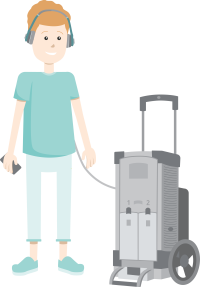Risks
 There are some risks with SynCardia TAH-t but your care team will work hard to keep you safe.
There are some risks with SynCardia TAH-t but your care team will work hard to keep you safe.
Infection
The soft cannula will come out of your lower chest and will need to be cleaned frequently. This is important because bacteria lives on your skin and may cause an infection at your cannula site. You may feel nervous the first few times your dressings are changed, but your care team will be there to support you.
High Blood Pressure
High blood pressure can affect the way the device works, so your care team will treat your blood pressure with medicines to keep it within a good range.
Bleeding
There is a risk of bleeding with all VADs, but it is more common with the SynCardia. To prevent clots from forming in the device, you have to be on a blood thinner. Sometimes the blood thinner will lead to bleeding that may require a change in medicines, a blood transfusion, or in some cases, a surgery to stop the bleeding. Your care team will manage your blood thinner medicine and levels carefully to try to prevent bleeding. Sometimes, even with perfect levels bleeding will occur.

Stroke
There is a risk of stroke with all VADs. A clot can form in the VAD, become dislodged, and may travel up a blood vessel to the brain. A blood clot in the brain leads to a decreased blood flow to the brain in that specific area, and this is called a stroke. Your care team will manage your blood thinner medicines and levels carefully to try to prevent a stroke. Sometimes, even with perfect levels, a stroke will occur.
Your care team will monitor you for the following symptoms:
- Headache
- Confusion
- Numbness and/or tingling on one side of the body
- Weakness on one side of the body
- Slurred speech
Device Malfunction
If the device were to stop working, blood flow to your body would completely stop until the device can be restarted. In addition, back up equipment will be nearby.
Noise
As the air compressors move the blood in and out of the body, it creates a pretty noisy environment. The heart rate is usually set between 125–145 beats per minute and you will hear each beat. Usually people get used to the sound but sometimes it can create anxiety or prevent sleep (noise cancelling headphones and earplugs may help).
